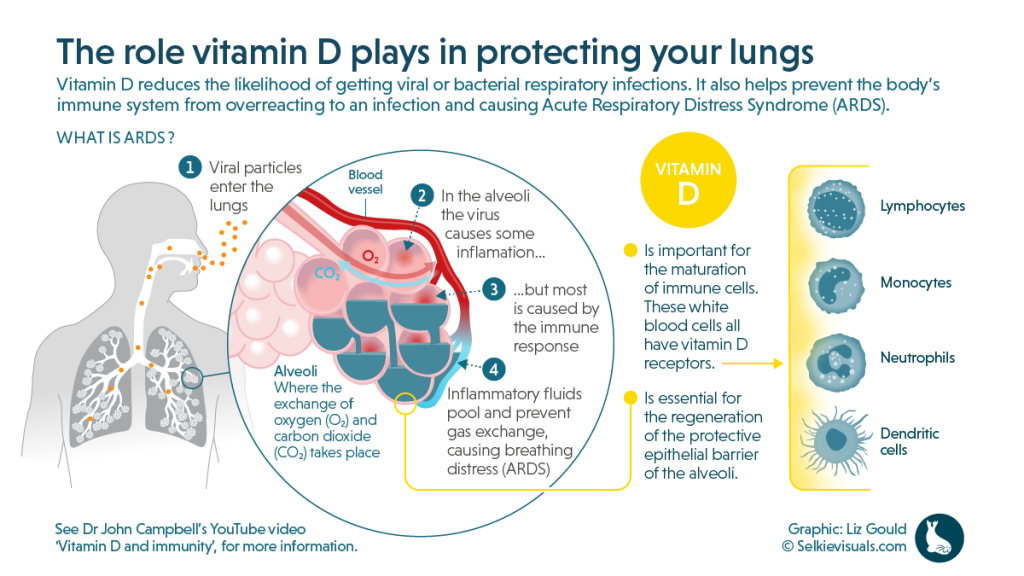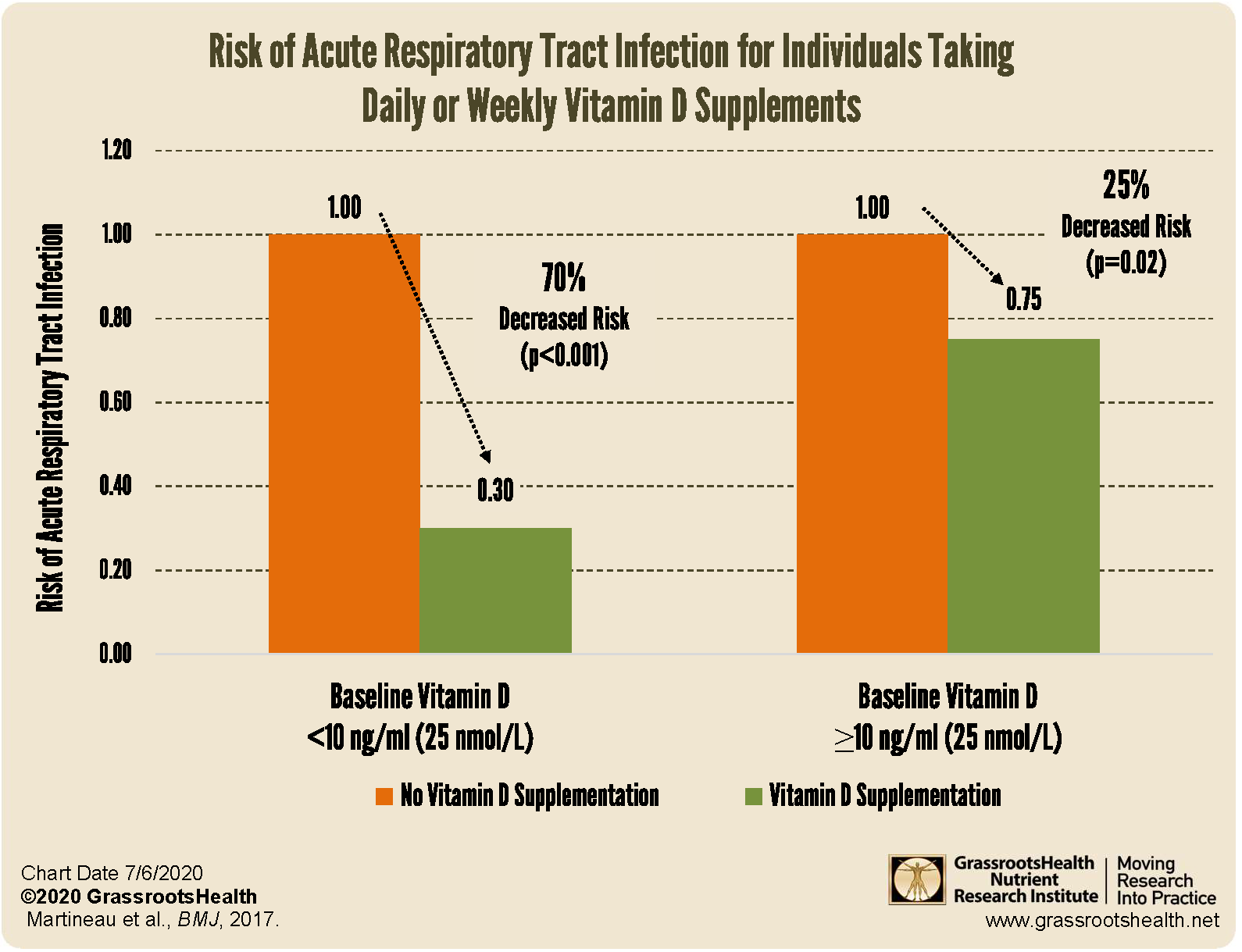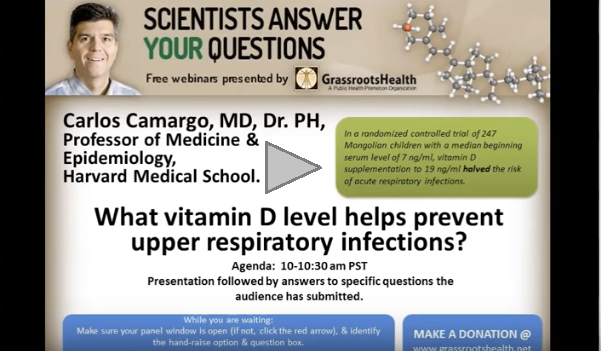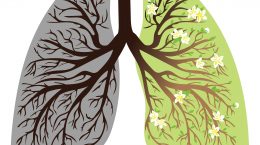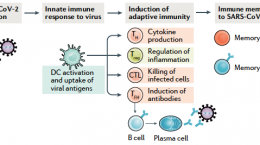Published on June 21, 2023
It’s Love Your Lungs Week! Here’s how vitamin D functions to directly protect your lungs.
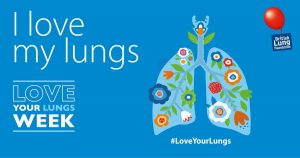 Love Your Lungs Week (formerly Breathe Easy Week) starts today to focus awareness on ways to keep your lungs healthy. Did you know that vitamin D plays a central role in lung health?
Love Your Lungs Week (formerly Breathe Easy Week) starts today to focus awareness on ways to keep your lungs healthy. Did you know that vitamin D plays a central role in lung health?
In the post below, we take a look at why vitamin D is important to the health and function of the lungs and respiratory system.
Summary of Overall Benefits of Vitamin D for Lung and Respiratory Health
Vitamin D functions in the respiratory system to:
- Protect against infection
- Support immune cell function (white blood cells) in the throat, airways and lungs
- Help regenerate the protective endothelial barriers
- Regulate the inflammatory response and prevent cytokine storm
Respiratory Diseases associated with low vitamin D include:
- COVID-19
- The “Common Cold”
- Infectious mononucleosis
- Influenza
- Pneumonia and ARDS
- Tuberculosis
- Asthma
Vitamin D Functions to Directly Protect the Lungs
Vitamin D acts to directly protect the lungs, from its effect on the protective barrier of the lungs, to its involvement in the maturation of immune cells, and its role in regulating the inflammatory response and inhibiting the cytokine storm. Cellular models have demonstrated the direct effect of vitamin D deficiency on the tissues within the lungs, which include increased alveolar inflammation, lung epithelial damage, and hypoxia (the deprivation of oxygen to surrounding tissues). This helps explain why vitamin D deficiency has been associated with an increased risk of developing pneumonia, Acute Respiratory Distress Syndrome (ARDS, aka wet lung), and sepsis, and why correcting vitamin D deficiency may help prevent damage to the lungs, such as when addressed prior to procedures of the upper respiratory tract such as oesophagectomy (surgery to the esophagus).
Vitamin D Deficiency Contributes to Acute Respiratory Distress Syndrome (ARDS)
ARDS is currently a major complication and cause of death among those with serious COVID-19 infections. Vitamin D seems to play a role in reducing ARDS and the severity and death due to COVID-19. The graphic below illustrates what happens in the lungs during ARDS, in which the air sacs of the lungs fill with fluid, preventing the uptake of oxygen. The condition leads to shortness of breath and difficulty breathing, and in severe cases, can lead to sepsis and/or death. Vitamin D helps to modulate inflammation and over-reaction of the immune response, therefore reducing the risk.
Vitamin D Helps Fight Respiratory Tract Infections – Decreasing Risk by up to 70%
Vitamin D has also been shown to reduce the risk of other types of acute respiratory tract infections. In a meta-analysis published in 2017, Martineau et al. set out to assess the effect of vitamin D supplementation on the risk of acute respiratory tract infection (RTIs). The review included 25 randomized, double-blinded, placebo controlled trials (RCTs), with a total of 11,321 individual participants. They found that vitamin D supplementation resulted in a statistically significant reduction in risk of RTIs among all participants, with a 12% lower risk of acute RTIs for those supplementing with vitamin D versus those with no supplementation. Even greater protective effects were seen among those receiving daily or weekly vitamin D supplements without additional bolus doses of 30,000 IU or larger.
The greatest protective effect was seen among participants who received daily or weekly supplementation and whose starting vitamin D level was less than 10 ng/ml (25 nmol/L), with a 70% decreased risk of acute RTI with vitamin D supplementation compared to a 25% reduction for those whose starting levels were greater than 10 ng/ml.
Video: Vitamin D and the Respiratory System – Preventing Infections
For more details on how vitamin D helps to protect the respiratory system and fights infections, watch this webinar by one of our international scientist panel members, Dr. Carlos Camargo, as he explains four key randomized controlled trials done in 2012 on vitamin D and respiratory infections.
Part 2 with continued questions and answers can be viewed here.
Publication of the Role of Vitamin D in Viral Respiratory Infections
For more in-depth reading, GrassrootsHealth, in collaboration with D*action Scientist Panel Member Dr. William Grant and others, have published a paper titled Evidence that Vitamin D Supplementation Could Reduce Risk of Influenza and COVID-19 Infections and Deaths. This paper is a review of the current research around the role of vitamin D in immune function, specifically in response to viral infections of the respiratory system. It outlines the relationship between vitamin D serum levels and the incidence of seasonal flu, as well as past epidemics such as those caused by the SARS and MERS coronaviruses. High risk conditions, the progression of illness, and mechanisms and proposed actions of vitamin D during the immune response are also reviewed.
Other Important Co-Nutrients for Respiratory Health
Don’t forget that vitamin D works along with other essential nutrients for our health. For our respiratory health, these include:
- Magnesium and Vitamin B12 for COVID-19
- Zinc and Selenium for proper immune response against viral infections. Zinc itself has been shown to increase immune response to respiratory tract infections and decrease the risk of pneumonia.
- Vitamin A for helping maintain the integrity of the respiratory lining and keep pathogens from gaining access to the body
- Vitamin C for colds and flu
- Iron; deficiency may contribute to the severity of respiratory tract infections
- Omega-3 fatty acids for their anti-inflammatory and immune modulating effects, and to reduce the risk of colds and flu
Are You Getting Enough Vitamin D and Other Nutrients to Support a Healthy Respiratory System?
With almost 90% of the general population having vitamin D levels below the recommended 40-60 ng/ml (100-150 nmol/L), it is obvious that most people need more vitamin D. While most of us cannot achieve a vitamin D level of 40-60 ng/ml from sun alone, either due to our lifestyle, where we live, or other circumstances, we can certainly reach those levels with the right amount of supplementation.
By joining the GrassrootsHealth projects, you are not only contributing valuable information to our study, but you are also gaining knowledge about how you could improve your own health through measuring and tracking your nutrient status, and educating yourself on how to improve it. Do you know what your status of vitamin D, omega-3s, and other essential nutrients is? Could your levels be improved? Test now to find out!
- Vitamin D
- Magnesium PLUS Elements
- Omega-3 Fatty Acids
- hsCRP
- HbA1c
- TSH
- Type 1 Diabetes Autoantibodies
Create your custom home test kit today. Take steps to improve the status of each of these measurements to benefit your overall health. With measurement you can then determine how much is needed and steps to achieve your goals. You can also track your own intakes, symptoms and results to see what works best for YOU.
Enroll in D*action and Test Your Levels Today!


